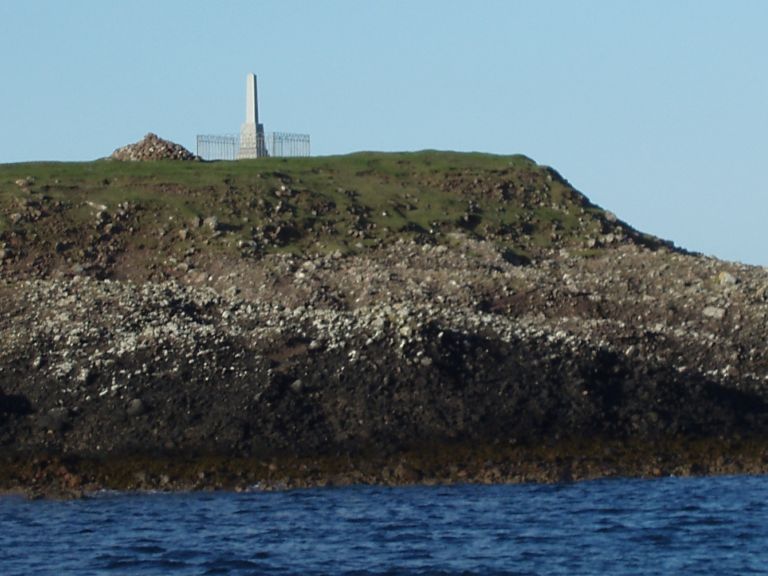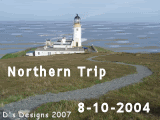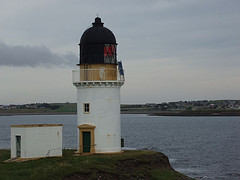On 31 December 1918, a group of some 500 men from the Isle of Lewis had arrived by train at the small fishing port of Kyle of Lochalsh, 80 miles west of Inverness, to join the ferry home to Stornoway. Under normal circumstances, this would be a six hour journey on board the Sheila, then the ferry plying the route to the Outer Hebrides. However, the number of men meant that the Sheila could not accommodate all. The Royal Navy hurriedly brought down Her Majesty's Yacht Iolaire, a converted private yacht that used to be called Amalthea. Although the sailors wanted to be home before midnight, the disorganised manner of their distribution over both vessels meant that anchors were not weighed until 7.30pm, meaning an estimated time of arrival in Stornoway at 1.30 a.m..
 The Iolaire headed north, through the channel between the Isle of Skye and the Scottish mainland, and by midnight reached the open waters of the Minch. Weather conditions gradually worsened, with a force 6 breeze gusting to galeforce whipping up a strong swell up the Minch. As the familiar blink of the Arnish Lighthouse, which stands at the entrance to Stornoway Harbour, came into view the men felt they were in home waters. Virtually all of them had come into their home port dozens of times before, and a near-gale would not have daunted them. As the Iolaire approached the lighthouse from the south, she was expected to make a turn to port to round the Arnish Peninsular. Nothing happened, and at 1.55 a.m., the Iolaire struck rocks at the Beasts of Holm, 2½ miles south of Stornoway.
The Iolaire headed north, through the channel between the Isle of Skye and the Scottish mainland, and by midnight reached the open waters of the Minch. Weather conditions gradually worsened, with a force 6 breeze gusting to galeforce whipping up a strong swell up the Minch. As the familiar blink of the Arnish Lighthouse, which stands at the entrance to Stornoway Harbour, came into view the men felt they were in home waters. Virtually all of them had come into their home port dozens of times before, and a near-gale would not have daunted them. As the Iolaire approached the lighthouse from the south, she was expected to make a turn to port to round the Arnish Peninsular. Nothing happened, and at 1.55 a.m., the Iolaire struck rocks at the Beasts of Holm, 2½ miles south of Stornoway. The vessel was stuck fast, and a panic broke out on board. Men tried to launch lifeboats, which foundered almost immediately. Other tried to jump overboard to gain the shoreline, only 25 yards away. They were smashed against the rocks by the heavy swell and many perished. It was a case of every man for himself. One man, from the district of Ness, managed to bring a line ashore and in a painfully slow process succeeded in bringing dozens to safety. Just before 3 a.m., the boiler exploded, which broke the ship's back. Iolaire went down, taking dozens with her to the bottom.
 . When dawn broke on that New Year's morning, just before 9 o'clock, a pitiful sight presented itself. The mast of the Iolaire protruded from the water, with one man bravely hanging on to the rigging, which he had been doing for six hours. Seven others who had been with him had not had the strength to hang on and had fallen in the water and drowned. The communities around Stornoway were presented with an even more gruesome sight. Bodies had come ashore, by the dozen. The Captain was found dead at Lower Sandwick, just a mile to the north, with two liferings around him. Others turned up at the Braighe, a few miles to the east. One body was found at Grimshader 5 months later. Eighty men, known to have been in the Iolaire, were never recovered. A total of about 205 men died that night; 75 survived.
. When dawn broke on that New Year's morning, just before 9 o'clock, a pitiful sight presented itself. The mast of the Iolaire protruded from the water, with one man bravely hanging on to the rigging, which he had been doing for six hours. Seven others who had been with him had not had the strength to hang on and had fallen in the water and drowned. The communities around Stornoway were presented with an even more gruesome sight. Bodies had come ashore, by the dozen. The Captain was found dead at Lower Sandwick, just a mile to the north, with two liferings around him. Others turned up at the Braighe, a few miles to the east. One body was found at Grimshader 5 months later. Eighty men, known to have been in the Iolaire, were never recovered. A total of about 205 men died that night; 75 survived. The blow to the island community was severe. Of the 12,000 menfolk of Lewis, half had joined up; as soldiers, sailors or in the Merchant Navy. One out of every six had perished in the war. And now another 200 were taken. It was even more poignant when it is born in mind that some of these men had been away from their families for 4 years, and their homes were prepared for their return. Food was on the hob, a warm bottle in the beds. Instead, the church elders were seen going through every village, dressed in deepest black. Not a family was left untouched, not a village unaffected. The village of Shawbost saw 9 funerals as a result of the Iolaire's sinking.
This was such a bodyblow, that to this day the event is not readily discussed in the island. It prompted a mass emigration of 400 young men to Canada in 1923 on board a ship called the Metagama. But that's another story.
I have worked with the Stornoway Historical Society to verify the names of those who were on board HMY Iolaire that night. I also managed to obtain portraits of several dozen men, which I have linked to the list and placed on the web.
I have also built a webpage to commemorate those lost. When you arrive here on the ferry fromUllapool, the Beasts of Holm are marked with a small pillar to the right of the ship as she enters the harbour. The pictures below show how close the Iolaire was to the shore - the pictures is taken from a small boat just inshore from the pillar. The monument was erected in memory of the 205 who drowned here.

The website prompted a lady from Vancouver Island to tell this story.
My grampa's younger brother, Donald MacLeod (7 Marbhig, then Stornoway), died coming into harbour on the Iolaire. From the memorial in South Lochs I think two of my greatgrandparents' brothers were killed in the war, as well as losing Donald. My grandfather Alasdair was forbidden from fishing anymore for fear he'd drown too, after his family's losses. A torment for him, as he loved the sea and fishing. He drove for Lord Leverhulme then went to the shipyards in Glasgow to make some money. He returned to Stornoway for a short time then came to Canada on one of the two ships for which there were no passenger lists. Settled in our praries for a time (no water at all) then went west to Vancouver Island for the remainder of his lifetime... built himself a little boat and enjoyed it to the end in 1980. So fortunate I visited Stornoway last summer and saw for myself why Alaisdair chose Nanaimo...it looked so like Stornoway... His mother I think suffered too much heartbreak for it all and was a lost soul in the sanatorium for the rest of her life. And oddly, when I've written lyrics all through my life they have been laden with images of water, and the sea...long before I knew of this event in my family's history. Funny how these things can follow you. I'd not be at all if it weren't for the Iolaire disaster...a ponderous thought, that.
Technorati Tags: iolaire, disaster












It must have been heartbreaking for those who thought there loved ones were safely on their way home, what an awful start to a year for them all. Jeannette xx
ReplyDeleteThat is so very sad. You do a good job of telling the story, and I appreciated the lady's personal family story.
ReplyDeleteLori
Totally interesting and terribly tragic! - Barbara
ReplyDeleteThis is such a sad story but I;m pleased you made us aware of it ,Guido ,it must have been devastating for the community ...love Jan xx
ReplyDelete